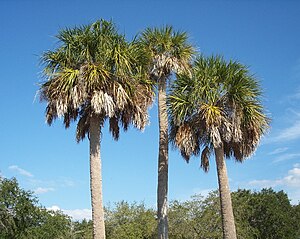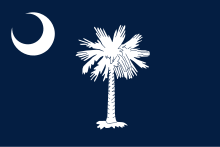Palmetto palm
| Palmetto palm | ||||||||||||
|---|---|---|---|---|---|---|---|---|---|---|---|---|

Palmetto palm ( Sabal palmetto ) |
||||||||||||
| Systematics | ||||||||||||
|
||||||||||||
| Scientific name | ||||||||||||
| Sabal palmetto | ||||||||||||
| ( Walt .) Lodd . |
The palmetto palm ( Sabal palmetto ) is a large-growing palm species whose natural range is in Florida , on the Atlantic coast of Georgia , South Carolina and southern North Carolina . It also occurs in western Cuba and with the exception of Grand Bahama , Abaco and South Andros in the Bahamas .
features
The palmetto palm grows up to 20 meters high and has a slender solitary trunk of gray color that can reach a diameter of 35 centimeters. The trunk is often wrapped in old leaf bases. Their leaves are fan-shaped and costapalmat, which means that they have a clearly pronounced midrib that extends far into the leaf blade. The leaf segments are notched deeply and are only connected to one another over the first third of their length. Threads hang down from their tips. The bushy, densely branched inflorescence is about as long as the leaves and forms hermaphroditic, white to cream-colored flowers from which black round fruits develop, which reach a diameter of 8 to 14 mm.
habitat
The palmetto palm has a high salt tolerance and grows mainly close to the coast on dunes, on river banks, in swamps, in marshes , in Cuba also in savannah-like surroundings. It tolerates flooding, including brackish water.
use
Palmetto palms are often planted as avenue palms or as garden plants in the southeastern United States. They are mainly taken from natural stocks, but are not endangered as a result, as they have a high potential for reproduction.
In the past, the Indians of southeastern North America used them in many ways. Their leaves were woven into baskets and hats, or ropes and sacks were made from the leaf fibers. The fresh fruits were eaten and their juice squeezed. It was used to relieve bronchial diseases and was considered an aphrodisiac . A juice pressed from the roots helped against high blood pressure.
The first fortification of Fort Moultrie near Charleston was built using palmetto trunks, which proved to be effective against artillery fire because of their spring action . Because of this probation, the palmetto palm was included in the flag of South Carolina in 1861 .
literature
- Jim Harrison: The Palmetto and Its South Carolina Home. University of South Carolina Press, Columbia 2012, ISBN 978-1-61117-049-8 .
- David Jones: Palms . Könemann, Cologne, 2000, ISBN 3-8290-4889-0
- Mario Stähler: Hardy palms. Medemia Verlag, ISBN 978-3940033017
